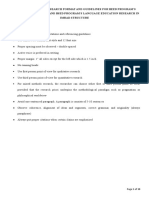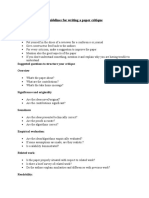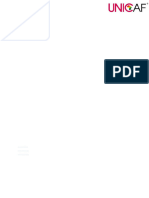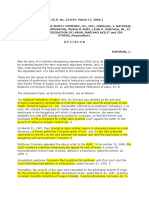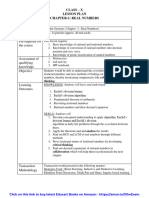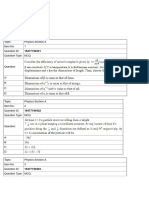HLTH9216 Article Critique F221
HLTH9216 Article Critique F221
Uploaded by
Kim Rabara TagordaCopyright:
Available Formats
HLTH9216 Article Critique F221
HLTH9216 Article Critique F221
Uploaded by
Kim Rabara TagordaOriginal Title
Copyright
Available Formats
Share this document
Did you find this document useful?
Is this content inappropriate?
Copyright:
Available Formats
HLTH9216 Article Critique F221
HLTH9216 Article Critique F221
Uploaded by
Kim Rabara TagordaCopyright:
Available Formats
HLTH9212 EVIDENCE-BASED DECSION MAKING:
SPRING 2021
EVALUATION
Community & Health Studies, School of Nursing & Personal Support Worker
Evidence-Base Decision Making HLTH9216 Credit Value: 6
Evaluation: Article Critique
Value: 20% of final grade
Due Date: As per the course Teaching and Learning Plan, this evaluation is due
Week 9.
Expectation: Utilizing the information from course material and discussion, as well as
additional research complete the assignment as outlined in the description. This is an
individual assignment. The final submission is to be completed in appropriate APA
format, with all researched material cited in the appropriate APA style. The
assignment is to be between 4-8 pages (double spaced) in length (not including title
page or appendices)
Submission: To be submitted electronically on Blackboard
Description: Article Critique
1. Effective evidence-based decision making is predicated on the use of well
written and conducted research. Evaluating academic research to ensure it has
been conducted in an effective manner, will assist in the selection of the
research that you would use in addressing an issue or concern.
2. Select an article that is related to an issue or concern in healthcare. The article
should be;
Minimum of 5 pages and a maximum of 15 pages of text (not including
title page, reference page, illustrations, tables, etc.)
Must be a quantitative, qualitative or mixed methods research study
Must be a research study related to healthcare issue
Must be original research (be careful that you are not reviewing
someone else’s literature review)
From a peer reviewed journal only
Must be an article written within the last 10 years
HLTH9212 EVIDENCE-BASED DECSION MAKING:
SPRING 2021
EVALUATION
Critique Format:
Consider the following questions as you read the article.
NOTE: You are critiquing the “quality” of the article and NOT your opinion of the
conclusions
1. Introduction
a. What is the main research problem addressed in the article?
b. Is the purpose of the research problem/study made clear?
2. Review of the Literature
Critique/Evaluate the literature review (e.g what are the shortcomings/strenghts).
a. For example, you can consider questions such as:
b. Has the author cited the pertinent, and only the pertinent, literature? If the
author has included inconsequential references, or references that are not
pertinent, suggest deleting them.
c. Have any ideas been overemphasized or underemphasized? Suggest specific
revisions.
d. Should some sections of the article be expanded, condensed or omitted?
e. Is the literature review clear? Challenge ambiguous statements. Suggest by
examples how clarity can be achieved, but do not merely substitute your style
for the author’s.
f. Is the review logically organized? Does it offer a balanced critical analysis of
the literature? Is the majority of the literature recent? Is the literature mainly
from primary sources of empirical nature?
g. Are all term, theories, concepts mentioned in the study clearly defined?
h. Were all books, journals and other meeting referenced in the study
appropriately and accurately referenced?
Methodology
Critique/Evaluate the design of the study.
For example, you can consider questions such as:
a. Is the research design clearly identified? Has the data gathering instruments
been described and is it appropriate to the design of the study? Were reliability
and validity testing undertaken and the results discussed? Was a pilot study
undertaken?
b. Is the study design and statistical methods(s) appropriate for the purposes of
the study (cite references to support your conclusion)?
c. Identify strengths and possible problems with the methods used.
HLTH9212 EVIDENCE-BASED DECSION MAKING:
SPRING 2021
EVALUATION
d. Have the procedures been presented in enough detail to enable a reader to
duplicate them?
e. Do you find any content repeated or duplicated?
f. Is the methodology logically organized? Does the research report follow the
steps of the research process in a logical manner? Do these steps naturally
flow and are the links clear?
g. Has the target populations been clearly identified? Was the sample size
adequate?
h. Was ethical permission granted for the study?
i. Were participants full informed about the nature of the research and was
confidentially explained/guaranteed?
3. Overall Critique
As a researcher, provide your opinion of the research study.
For example, you can consider questions such as:
a. Is the article well written (e.g. concise, coherent, grammatically correct,
readable)?
b. Is the article well laid out and organized (e.g. does it follow proper format)?
c. Does the title reflect the study? Is it clear, accurate and unambiguous?
HLTH9212 EVIDENCE-BASED DECSION MAKING:
SPRING 2021
EVALUATION
Article Selection
Adequate (70 – 100%) Requires Improvement (0 – 69%)
Article is peer reviewed Article does not meet all of the requirements
Article contains original research including
empirical evidence
Article provides a good example of one of
quantitative, qualitative or mixed methods design
Article is current (no more than 10 years old)
Article is related to Organizational Assessment
and Accountability.
Critique of Article
Adequate (70 – 100%) Requires Improvement (0 – 69%)
All explanations clear and easy to understand, Some critical details missing, unnecessary details
factually correct may be present
Appropriate quotations and citations are made to Serious difficulty explaining ideas, major factual
help the reader understand the article errors; lack of comprehensibility
All technical terms used correctly and defined Jargon terms used incorrectly, without definition;
clearly, including terms with different common attempting to sound "scientific" without
meanings; overuse of jargon avoided understanding meaning
Error-free, easy to read writing style, well Errors and awkwardness, excessive use of
practiced and polished use of language quotations in place of author's own words,
The paper is an in-depth examination of the excessive paraphrasing
literature review and methodology parts of the
research process
No personal views are expressed, and the critique
is objective, highlighting strengths and limitations
of the study
Writing and APA
Adequate (70 – 100%) Requires Improvement (0 – 69%)
Writing style consistent with graduate level Writing style inconsistent with graduate level
expectations expectations
o Basic coherence and unity is Unity and coherence not demonstrated at the
demonstrated in writing level required for this course; requires
o No spelling, grammar, formatting, refinement/development
referencing errors Spelling, grammar, formatting and/or
APA is correct referencing errors present
No personal pronouns are used APA has errors and/or requires development
Personal pronouns are used
A B C
You might also like
- Auerbach C. SSD For R. An R Package For Analyzing..Data 2ed 2022Document296 pagesAuerbach C. SSD For R. An R Package For Analyzing..Data 2ed 2022top dicas100% (1)
- Sample Extracts Critical ReviewDocument5 pagesSample Extracts Critical ReviewHazell Hassan100% (1)
- Tuma Research ManualDocument57 pagesTuma Research ManualKashinde Learner Centered Mandari100% (2)
- FDSDFSDFFSSFDDocument7 pagesFDSDFSDFFSSFDberotlogisticsNo ratings yet
- Purpose of A Critical ReviewDocument4 pagesPurpose of A Critical ReviewMelikteNo ratings yet
- Individual Literature ReviewDocument3 pagesIndividual Literature Reviewprojectwork185No ratings yet
- Tutorial 5 - Key Debate, Models and StylesDocument17 pagesTutorial 5 - Key Debate, Models and StylesSyahmina AnwardeenNo ratings yet
- FMA Assignment 02Document4 pagesFMA Assignment 02Chala oll irra100% (1)
- UGB371 - Assignment Question - 2021Document5 pagesUGB371 - Assignment Question - 2021Masum ZamanNo ratings yet
- What Is An Academic Paper ArticleDocument3 pagesWhat Is An Academic Paper ArticlemeerahNo ratings yet
- Peer Review Topic DiscussionDocument4 pagesPeer Review Topic Discussionapi-661456802No ratings yet
- Reglamento de Evaluacion Del Estudiante de La UCLMDocument15 pagesReglamento de Evaluacion Del Estudiante de La UCLMdfuentesNo ratings yet
- Individual Assignment 1 + Marking SchemeDocument3 pagesIndividual Assignment 1 + Marking SchemeHoor AsifNo ratings yet
- Humza ReviewDocument2 pagesHumza ReviewnasnahadNo ratings yet
- UGB322 Assessment Jan14Document2 pagesUGB322 Assessment Jan14my hoangNo ratings yet
- Lecture 4.1 - Component 1 - The Leadership MatrixDocument11 pagesLecture 4.1 - Component 1 - The Leadership MatrixSyahmina AnwardeenNo ratings yet
- Undergrad U WagDocument5 pagesUndergrad U WagPhiliplukaNo ratings yet
- Peer Review GuidelinesDocument2 pagesPeer Review GuidelinesXinless ChiNo ratings yet
- It Right A Guide To Academic and Professional Excellence 1.PDF 20241126 003833 0000Document4 pagesIt Right A Guide To Academic and Professional Excellence 1.PDF 20241126 003833 0000micaelamadaelNo ratings yet
- Article Review GuidelineDocument3 pagesArticle Review Guidelinemaya well100% (1)
- Assessment GuidelinesDocument12 pagesAssessment GuidelinesvarunNo ratings yet
- 6MARK015W S2 Assessment 2 Individual Report BriefDocument10 pages6MARK015W S2 Assessment 2 Individual Report Briefمحمد عثمانNo ratings yet
- Preparation Assignment 1 ReferralDocument6 pagesPreparation Assignment 1 ReferralBinhMinh NguyenNo ratings yet
- RM RoL Assignment GuidelinesDocument4 pagesRM RoL Assignment Guidelineskuldeepchou2000No ratings yet
- The Park Place Economist Issues in Political EconomyDocument2 pagesThe Park Place Economist Issues in Political EconomyamirahalimaNo ratings yet
- Critic 05Document2 pagesCritic 05Baba HansNo ratings yet
- Please Consider The Following Tips While Proofreading My AssignmentDocument2 pagesPlease Consider The Following Tips While Proofreading My Assignmentemo_transNo ratings yet
- EDITED IFY BUS STUD EAP Reading CW STUDENT INFODocument6 pagesEDITED IFY BUS STUD EAP Reading CW STUDENT INFOGunel AllahverdiyevaNo ratings yet
- Managerial AssignmentDocument2 pagesManagerial Assignmentsolomon asefaNo ratings yet
- comment (1) (1)Document13 pagescomment (1) (1)Getnet MuhabawNo ratings yet
- Grading Rubric For Essay WritingDocument3 pagesGrading Rubric For Essay WritingMizfa Carpio MacatbagNo ratings yet
- MarkDocument2 pagesMarkrockytang1998No ratings yet
- # 5 - Self - and Peer-Review Guidelines + Activity + RUBRIC - Semester 2, 2022-23Document3 pages# 5 - Self - and Peer-Review Guidelines + Activity + RUBRIC - Semester 2, 2022-23Joel DixonNo ratings yet
- Research FormatDocument10 pagesResearch FormatLea Pearl Imbang Francisco IINo ratings yet
- Assignment StudentDocument8 pagesAssignment StudentAshley Ooi Shi QiNo ratings yet
- EE Assessment criteria checklist (2)Document4 pagesEE Assessment criteria checklist (2)familylovesu9No ratings yet
- Assessment Brief Assignment 1Document4 pagesAssessment Brief Assignment 1Yvonne IoanaNo ratings yet
- BM7902 002 Assessment Extra Hintstips On StructureDocument2 pagesBM7902 002 Assessment Extra Hintstips On StructureMuhammad Faraz HasanNo ratings yet
- Summative Test in PR1Document2 pagesSummative Test in PR1shyril santosNo ratings yet
- Some General Criteria For Evaluating TextsDocument4 pagesSome General Criteria For Evaluating TextsZulBachrakNo ratings yet
- Individual Coursework Portfolio Module Code: Module Title: SessionDocument17 pagesIndividual Coursework Portfolio Module Code: Module Title: SessionFadele Ayotunde AlabaNo ratings yet
- Guidelines For Writing A Paper CritiqueDocument4 pagesGuidelines For Writing A Paper CritiquemhaedeppNo ratings yet
- ASSESSMENT 3 OVERVIEW - Critical Appraisal of Evidence: InstructionsDocument4 pagesASSESSMENT 3 OVERVIEW - Critical Appraisal of Evidence: InstructionsHuge Lovely SmileNo ratings yet
- Final May 1 2024 Task On Reading Writing ClassDocument8 pagesFinal May 1 2024 Task On Reading Writing Classspotifyej242007No ratings yet
- Summative Task GuidelinesDocument5 pagesSummative Task Guidelinesp74yjwwhbkNo ratings yet
- English 2 Argumentative Research Essay RubricDocument1 pageEnglish 2 Argumentative Research Essay Rubricapi-250150574No ratings yet
- Leading Organization Assignment (EGS MBA)Document4 pagesLeading Organization Assignment (EGS MBA)JimmyNo ratings yet
- Checklist For Final Research PaperDocument4 pagesChecklist For Final Research PaperEliasMamushetNo ratings yet
- Copy of Paper II an OverviewDocument2 pagesCopy of Paper II an OverviewrichelletherookieNo ratings yet
- Med First/Joint Marker Form: 1: Grade Awarded & Overall CommentDocument2 pagesMed First/Joint Marker Form: 1: Grade Awarded & Overall Commentapi-299069411No ratings yet
- Materi LastikaDocument37 pagesMateri Lastikadhanabrata981No ratings yet
- Maryland International College: School of Graduate Studies Human Resource Management Assignment (50%)Document2 pagesMaryland International College: School of Graduate Studies Human Resource Management Assignment (50%)Abebaw FelekeNo ratings yet
- EE Presentation and Guidelines 2Document15 pagesEE Presentation and Guidelines 2Sophie JosenNo ratings yet
- Assignment 1Document5 pagesAssignment 1sarithaNo ratings yet
- MKT2204 Essay Jan2022 AmendedDocument7 pagesMKT2204 Essay Jan2022 AmendedDilox A/L PrachotNo ratings yet
- BB101 - Group Assignment, SEP 2021Document4 pagesBB101 - Group Assignment, SEP 2021Huy NguyễnNo ratings yet
- What You Should Include in An EEDocument4 pagesWhat You Should Include in An EEkevinnishitoyoNo ratings yet
- Scoring Performance-Based Assessment and Authentic Assessment Using Various ToolsDocument7 pagesScoring Performance-Based Assessment and Authentic Assessment Using Various ToolsAmethyst ChiongNo ratings yet
- Lessonplanmarkerform Sept15Document2 pagesLessonplanmarkerform Sept15api-298926617No ratings yet
- Paper 1 882023 1Document2 pagesPaper 1 882023 1bypass.ai001No ratings yet
- Review of The Related LiteratureDocument14 pagesReview of The Related LiteratureRenatus KatunduNo ratings yet
- Academic Writing - School and College Students: Learn Academic Writing EasilyFrom EverandAcademic Writing - School and College Students: Learn Academic Writing EasilyNo ratings yet
- Cayetano V MonsodDocument2 pagesCayetano V MonsodKim Rabara TagordaNo ratings yet
- Civ Rev Case 1Document2 pagesCiv Rev Case 1Kim Rabara TagordaNo ratings yet
- Labor Law Review Cases For MidtermsDocument253 pagesLabor Law Review Cases For MidtermsKim Rabara TagordaNo ratings yet
- Ilocos Sur National High School: Hon. Luis "Chavit" C. SingsonDocument2 pagesIlocos Sur National High School: Hon. Luis "Chavit" C. SingsonKim Rabara TagordaNo ratings yet
- 16 20Document31 pages16 20Kim Rabara TagordaNo ratings yet
- Learning Activity Sheet: / Semester: 2Document9 pagesLearning Activity Sheet: / Semester: 2Kim Rabara TagordaNo ratings yet
- Taxation Law 1 I. General PrinciplesDocument3 pagesTaxation Law 1 I. General PrinciplesKim Rabara TagordaNo ratings yet
- Principles of Learning What Did The Model Teacher Do Which Applies/contradicts The Learning Principle Remarks/ReflectionDocument2 pagesPrinciples of Learning What Did The Model Teacher Do Which Applies/contradicts The Learning Principle Remarks/ReflectionKim Rabara TagordaNo ratings yet
- Running Title: Cognitive Reflection Test Mcq-2 & Mcq-4: Msirota@essex - Ac.ukDocument36 pagesRunning Title: Cognitive Reflection Test Mcq-2 & Mcq-4: Msirota@essex - Ac.ukIkhwan WiraNo ratings yet
- PR1 Q4 Week 1 2Document4 pagesPR1 Q4 Week 1 2Ashley Nicole LazoNo ratings yet
- Title of Project: Envr 504 Research Project ProposalDocument3 pagesTitle of Project: Envr 504 Research Project ProposalMisha HaroonNo ratings yet
- JUPIMAN+-+Vol 2,+no 4+desember+2023+hal+108-123Document16 pagesJUPIMAN+-+Vol 2,+no 4+desember+2023+hal+108-123Alamria PramanaNo ratings yet
- PR1 Chapter 3Document5 pagesPR1 Chapter 3Ece CapiliNo ratings yet
- Chap 4Document4 pagesChap 4RUHDRANo ratings yet
- CASESTUDYINEDUCATIONALMANAGEMENTOnlineDocument72 pagesCASESTUDYINEDUCATIONALMANAGEMENTOnlineibrahimNo ratings yet
- GeometryDocument14 pagesGeometryJanice RomeroNo ratings yet
- Lecture Chi Square Non Parametric TestDocument41 pagesLecture Chi Square Non Parametric TestDstormNo ratings yet
- Major Characteristics of Qualitative ResearchDocument16 pagesMajor Characteristics of Qualitative ResearchJam Gumanoy NavarroNo ratings yet
- Chapter 1 Real Numbers (JNV)Document18 pagesChapter 1 Real Numbers (JNV)swatiNo ratings yet
- Template - MC SSE 113 Module 2Document4 pagesTemplate - MC SSE 113 Module 2Zenabi IbañezNo ratings yet
- Experimental Psychology HandoutDocument35 pagesExperimental Psychology HandoutJay HeograpiyaNo ratings yet
- Steps in The Formulation of The Research ProblemDocument10 pagesSteps in The Formulation of The Research ProblemPayal SharmaNo ratings yet
- Types of Sampling Designs Methods of SamplingDocument27 pagesTypes of Sampling Designs Methods of SamplingAngellie AntolanNo ratings yet
- Acebog - Eng1-Finals Module - Leganes - Bsba 1 - A B CDocument29 pagesAcebog - Eng1-Finals Module - Leganes - Bsba 1 - A B Cma. tricia soberanoNo ratings yet
- Thesis Background of The Study SamplesDocument6 pagesThesis Background of The Study Sampleslaurahansenfargo100% (2)
- Agriculture ReportDocument14 pagesAgriculture ReportAsfatin AmranNo ratings yet
- Research 1 - Module 5Document3 pagesResearch 1 - Module 5Arnold CabanerosNo ratings yet
- Chapter 1 The Research ProcessDocument36 pagesChapter 1 The Research ProcessRICA MAE NAVARRONo ratings yet
- Literature ReviewDocument2 pagesLiterature ReviewDiether MiclaNo ratings yet
- NCSC Program Guidelines (English)Document50 pagesNCSC Program Guidelines (English)mehul.gamer21No ratings yet
- Literature Review Examples EngineeringDocument6 pagesLiterature Review Examples Engineeringgw21tcyd100% (1)
- Factors Affecting The Academic Performance of StudentsDocument23 pagesFactors Affecting The Academic Performance of StudentsChrisna May TalanquinesNo ratings yet
- Paper 20230323123259Document33 pagesPaper 20230323123259SaήjaγKsNo ratings yet
- Chapter 3Document49 pagesChapter 3LAINEL ALVAREZ REYESNo ratings yet
- Inquiries m5Document17 pagesInquiries m5Ivy LunaNo ratings yet
- Haile 2021 Critical Appraisal Tools and Reporting GuidelinesDocument7 pagesHaile 2021 Critical Appraisal Tools and Reporting GuidelinesRadityaRachman LandapaNo ratings yet

































